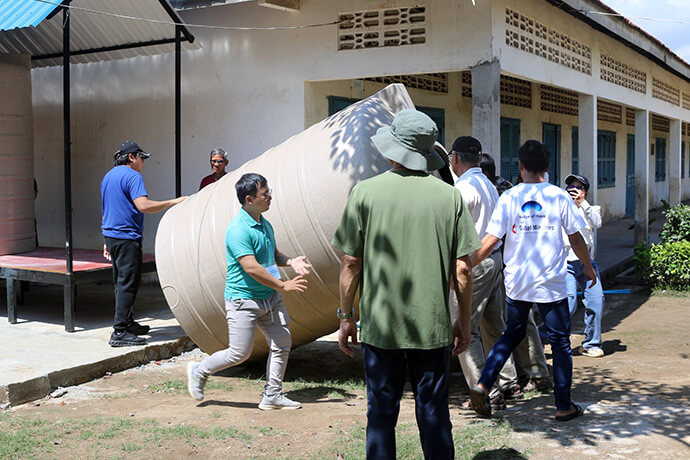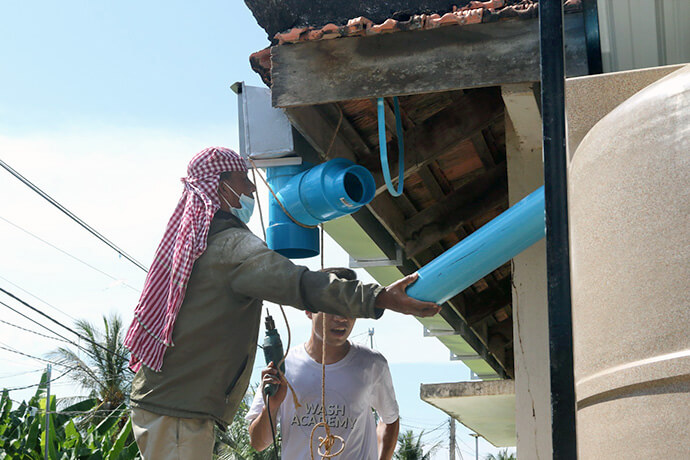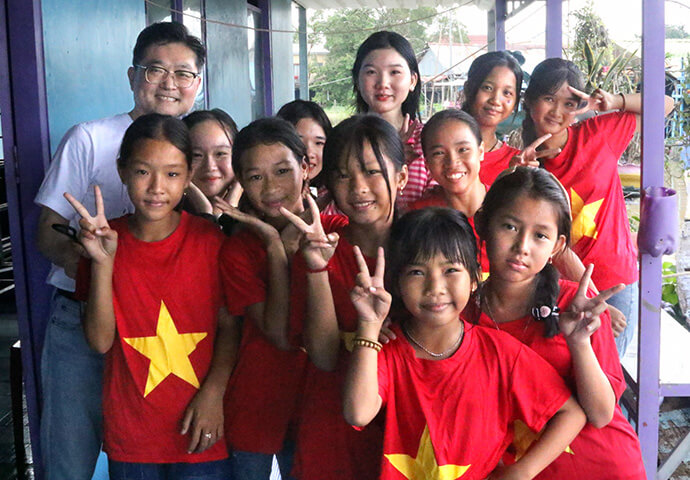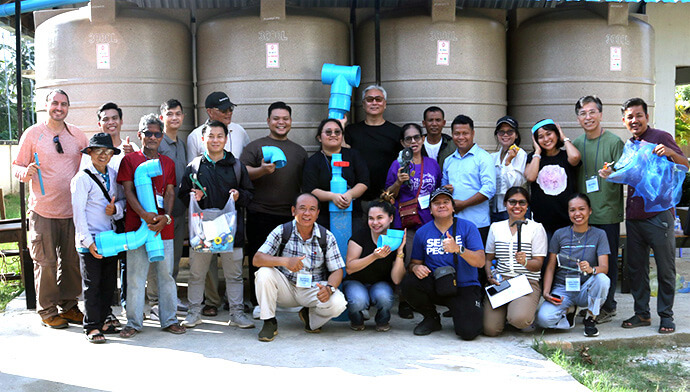Key points:
- Held Oct. 13-17 in Phnom Penh, Cambodia, a United Methodist-supported WASH Academy brought together church and community leaders to learn practical solutions for improving access to clean water.
- In some rural areas, only one in four residents has reliable access to clean water. Development of simple, sustainable methods of rainwater collection and purification have improved the situation.
- Education on the importance of hygiene and sanitation also is important.
Under the blazing Cambodian sun, a group of faith-driven pastors and mission practitioners spent five days doing more than just learning about clean water — they helped build systems to improve access.
Held Oct. 13-17 at Hope Vocational School in Phnom Penh, the WASH (water, sanitation and hygiene) Academy brought together church and community leaders from Cambodia, Laos, Myanmar, the Philippines and Vietnam. Hosted by the United Methodist Board of Global Ministries and its Korean nongovernmental organization partner Bridge of Hope, the event combined blunt assessments, practical solutions and a steady current of hope.
“The early years of our mission were about digging wells,” said the Rev. Paul Kong, Global Ministries’ Asia-Pacific regional representative. “But in many areas, the wells dried up, or they became contaminated within a few years. We realized we needed a more sustainable solution.”
That realization led to a partnership with Seoul National University to develop a simple and effective rainwater-harvesting and purification system.
“Unlike traditional wells, this system can be maintained locally and adapted to different community settings,” Kong said.

The Academy opened with country presentations and a keynote lecture on access to clean water.
From Cambodia, Thy Leng described both rural realities and recent progress.
“Many rural families still rely on unsafe sources such as sewage and river water,” he said. “In some places, only one in four rural residents have reliable access to clean water. The poorest households simply cannot afford to connect to the system. Water should be available for all rural people, not just those who can afford it.”
Leng added that education on the importance of hygiene and sanitation has been key.
“During the pandemic, we saw a dramatic reduction in water-related health risks in small villages,” he said.

From Laos, C.C. highlighted uneven progress.
“Access to clean drinking water has improved, but disparities between urban and rural areas remain stark,” C.C. said. “About 84% of the population has at least basic water services, yet many rural families still rely on streams or unprotected wells.”
Geography and funding complicate the challenge. Mountainous terrain, scattered populations and limited budgets make infrastructure difficult to sustain. Agricultural runoff, unregulated mining and poor waste management threaten both surface and groundwater. Floods and droughts linked to climate change also damage systems and contaminate wells.
Still, C.C. pointed to collaboration as a sign of hope. UNICEF, Seoul National University and the Abundant Water Ceramics Program are supporting school WASH projects, climate-resilient infrastructure and affordable filtration.
“Progress is real, but long-term success depends on community ownership,” C.C. said.

Representing Myanmar, Saw Ye Yint Htoo described the paradox that despite the abundance of rivers and rainfall in the country — more than 2,000 millimeters annually in many regions — millions still lack safe, reliable drinking water.
“About 57% of people use safely managed drinking water, and 61% have access to clean water. That means nearly 40% still rely on unsafe or unimproved sources, especially in rural and conflict-affected areas,” Htoo said.
A four-woman delegation from the Philippines offered perspectives from across the islands.
“Even though we are surrounded by oceans and seas, more than nine million Filipinos still rely on unsafe or unreliable water sources,” said Coleen Isabel Juan Agapinay. “Pollution, weak regulation and uneven service hit rural and coastal communities the hardest.”
Mizpah Carnate Atrero noted that rainwater harvesting is both affordable and effective in poor communities, while Carmy Erika Caspillan Bumanlag and Kea Kyla Hugo Paderes emphasized leadership development.
“The Filipino experience shows that sustainability begins with empowerment,” they said. “When communities manage their own systems, they protect both their water and their dignity.”
From Vietnam, V.T.D. linked climate volatility to daily survival.
“We have abundant rivers and rainfall, but flooding, drought and saltwater intrusion are intensifying, especially in the Mekong Delta,” V.T.D. said. “Rapid industrial growth and agricultural runoff are degrading groundwater quality. Communities can feel it in their wells.
“Clean water is life itself — and when we share it, we share hope.”

Keynote speaker Dr. Myung Keun Chang, environmental engineer and chief executive officer of Waves to Oceans Co., Ltd., drew a direct line between science and stewardship.
“Water never disappears; it only changes form and returns. If we care for it, it will care for us,” he said. “Good design is only half the job. The other half is consistent maintenance by the community.”
Moving from principle to practice, Chang demonstrated how communities can collect, store and reuse rainwater safely.
He recommended simple measures such as first-flush diverters, mesh screens, sealed tanks and regular cleaning. Overflow, he added, “is not failure but a feature — giving excess water a safe path to recharge the ground.
“Science gives us tools,” Chang concluded, “but wisdom comes when we use them to serve people and protect creation.”
Subscribe to our
e-newsletter
After classroom sessions, participants visited Kambol High School to study an existing system and discuss improvements. They practiced measuring catchment areas, inspecting filters, confirming overflow routes and shadowing local caretakers.
They also visited Agape Garden Church, located in a floating village on the Tonlé Sap River — home to Vietnamese refugees known as “boat people.” Still unwelcome in both Cambodia and Vietnam, they live without legal status, education or access to clean water.
What the participants witnessed revealed a painful truth: Access to drinking water is not only a matter of justice, but of life itself.
“Sixty children attend the church,” Kong said. “Since the congregation, equipped with a water tank, began offering child care and clean-water facilities, no child has drowned.”
The Asia-Pacific Office of Global Ministries provided funds for the church, which serves about 250 families — roughly 1,000 people — to purchase water-purification filters, offering both physical relief and renewed hope.
The WASH Academy grew out of those needs. “We launched this training so participants could learn design, maintenance and community education,” Kong said. “Our goal is not only to provide clean water but to empower people to secure it for themselves — improving health, dignity and quality of life for entire communities.”
Academy participants installed new rainwater-harvesting tanks at Hun Sen Sa’ng High School and Perak Treng Primary School, teaching school officials how to operate and maintain the systems. By week’s end, participants received certificates and left with both technical skills and renewed conviction that clean water is both a right and a responsibility.
Global Ministries’ Asia-Pacific Office and Bridge of Hope plan to continue supporting WASH Academy graduates.
“We have limited grants to help participants apply what they learned by installing rainwater-harvesting systems in rural communities where clean water is scarce,” Kong said. “The Academy showed us that sustainable mission means empowerment. When communities take ownership of clean water, they also claim ownership of their future.”
Kim is director of Korean and Asian news at United Methodist Communications. Contact him at 615-742-5470 or newsdesk@umnews.org. To read more United Methodist news, subscribe to the free UM News Digest.



